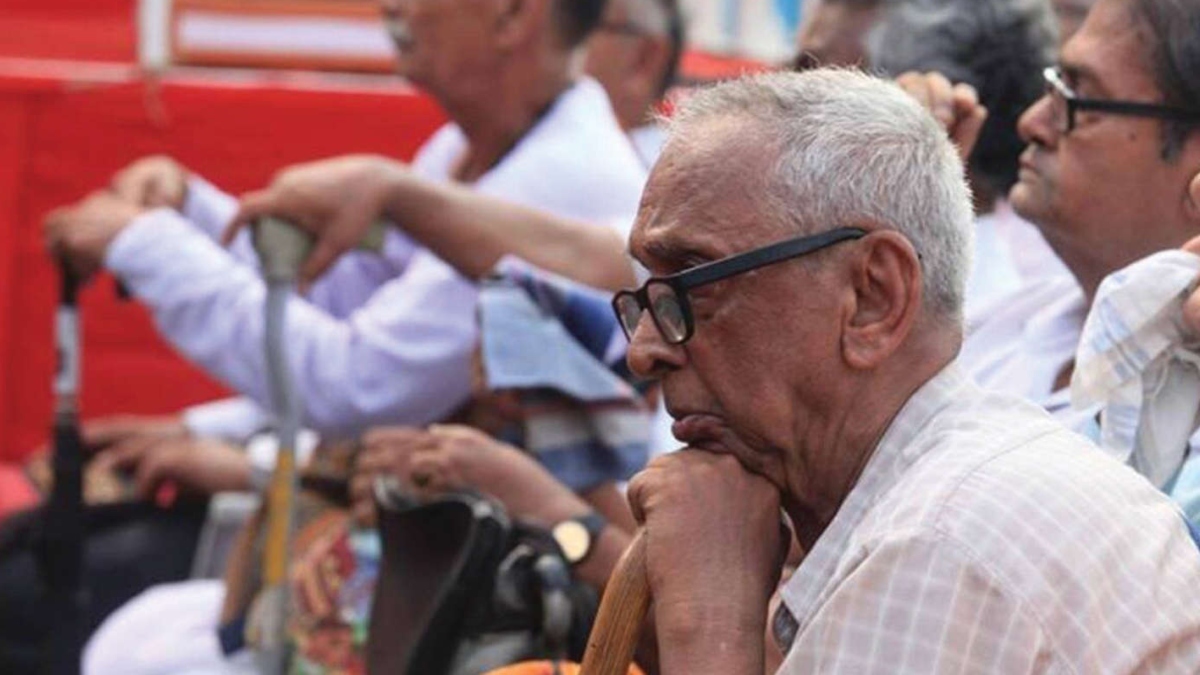


Social security is a basic human right, which was recognized in the United Nations Declaration of Human Rights in 1948. The Right to life, recognised as a fundamental right by Article 21 of the Constitution of India, implies the Right to live with human dignity. It encompasses not only the security regarding the basic human needs of food, clothing and shelter, but also health security. Social security schemes usually give priority to income security because, generally, the basic needs of the vulnerable sections may be satisfied, if people have an adequate income. Most of the elderly become vulnerable due to their inability to work and earn. Vulnerability due to advancing age can be anticipated in time, and can be mitigated by making specific provisions if one has an adequate income. In traditional agricultural societies, families, especially in the joint family system with multi-generational co-residence, usually take care of the economic and emotional security needs of the elderly. When people and families are not able to make arrangements for the care of the elderly, their needs must be provided for by society/state, either in cash or kind, through social insurance and social assistance schemes.
In developed countries, the elderly people are covered by an elaborate system of social security. The nature of the issues of the elderly in developing countries is vastly different due to factors such as chronic poverty, unemployment and underemployment as well as the existence of a large informal sector. Many researchers have, therefore, argued for the need to adopt a more extensive notion of social security in developing countries, because the type of social security programmes implemented in developed industrialised countries is generally neither appropriate nor economically feasible in poor countries.
The other aspect which we need to understand is social entitlements, which refer to the various rights and benefits that individuals are entitled to receive from the government to meet their basic needs and improve their quality of life. While social entitlements are influenced by a country’s economic capacity, social priorities, and political decision, social security measures are influenced by historical, economic, and cultural factors, as well as the overall structure of its social welfare system.
For instance, if we look at Canada, it has a well-developed social welfare system that provides various entitlements and benefits to its citizens. Canada provides Old Age Security (OAS) and the Guaranteed Income Supplement (GIS) to seniors, ensuring financial security and dignity in retirement. These pensions play a crucial role in reducing poverty among the elderly population. However, economists critically talk about high taxation, and complex administration combined with bureaucracy and delays. One of the most criticized programmes is Canada’s universal healthcare system which ensures access to medical services for all, which leads to seniors experiencing longer wait times for elective procedures and specialist consultations.
In India, too, a couple of schemes like the Indira Gandhi National Widow Pension Scheme, empowers the women and provides them with a safety net. The critical analysis definitely highlights that the pension amounts provided under these schemes are often relatively low, making it challenging for older individuals to cover their living expenses, especially in light of inflation. At the same time, not all older individuals in need may be covered by these schemes, as some may not meet the eligibility criteria or may be unaware of the available support. Further, the application and verification process for pension schemes can be bureaucratic and time-consuming, leading to delays in receiving benefits.
Over and above these, in a multi-state scenario, the availability and accessibility of social security measures varies across different states, leading to disparities in support for older individuals. And yes, this age-group, by no means has an exception when it comes to administrative inefficiencies and irregularities in the disbursement of pension payments, causing delays at times or even non-payment in some cases. Fraud and leakage, where ineligible beneficiaries may receive benefits, while some deserving individuals miss out is also an integral part.
India is a young country in terms of demography, but ageing gradually. The share of the elderly in total Indian population has risen to 8.6% in 2011 from 5.6% in 1961, and is projected to increase to 12.4% by 2026. India is currently benefiting from a demographic dividend, characterized by a large working-age population that drives economic growth. However, this advantage will gradually diminish over the next few decades as the young population ages, leading to an increase in the elderly population. If this transition is not addressed proactively, the fiscal cost of providing social security measures, such as pensions and other benefits, to support the aging population could become overwhelming.
Overall, social security measures for older people in India have the potential to provide much-needed financial support and social protection. However, there are challenges that need to be addressed to improve the effectiveness and reach of these schemes. Policymakers need to focus on enhancing the coverage and amount of pensions, streamlining administrative processes, and raising awareness to ensure that all eligible older individuals can benefit from these social security measures.
In reality, individuals or families living on such a small pension struggle to meet their daily needs and face severe financial hardship. While the government is aware of the challenges faced by elderly people living on low pensions, and there have been efforts to increase pension amounts and provide additional support through various social welfare programs, there is still a long way to go to ensure that all vulnerable and elderly people can meet their basic needs and live with dignity.
Two key aspects worth considering are: one, encouraging “Active Aging”, wherein older people continue to work and participate in meaningful activities, which will boost not only economic but mental and social well-being. And two, raising awareness about retirement planning and social security benefits, which is crucial to ensure that they understand their rights and also start accessing available support.
Dr Benazir Patil is Chief Executive Officer, Society of Community Health Oriented Operational Links (SCHOOL).